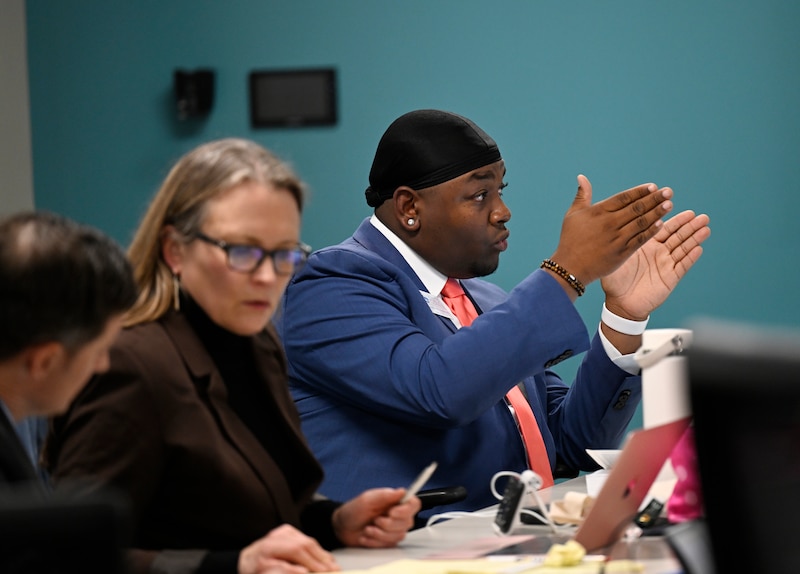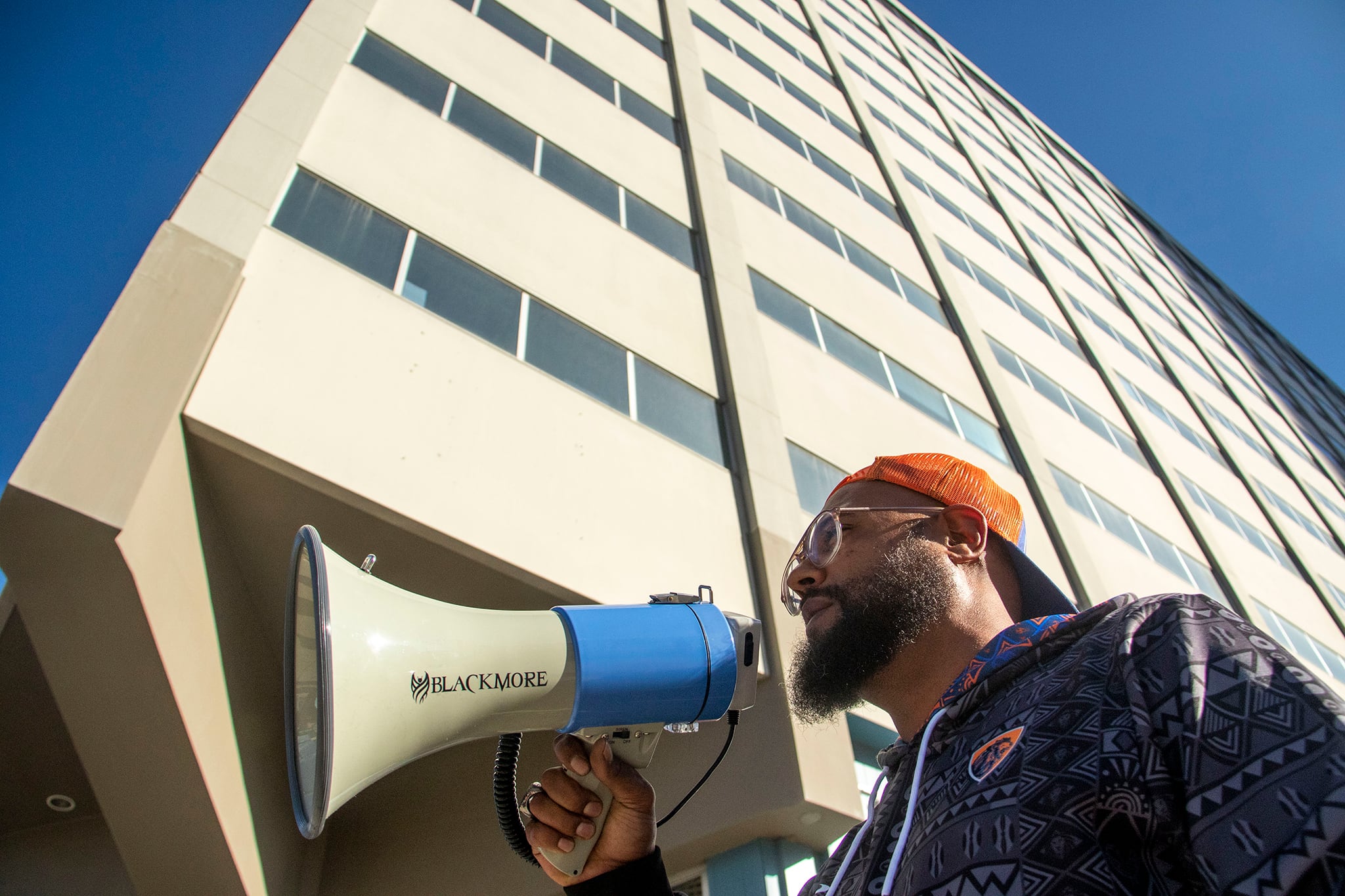Denver school board Vice President Auon’tai Anderson has obtained a restraining order and filed a criminal complaint against vocal district critic Brandon Pryor, who recently won a court victory overturning Denver Public Schools’ efforts to bar him from district property.
Both men agree they had an argument Friday morning about Anderson’s December vote to move the school Pryor founded, Robert F. Smith STEAM Academy, from its current location to a former elementary school miles away from the Far Northeast community it serves. But their accounts of what happened differ.
In an affidavit filed with Denver County Court and in an interview with Chalkbeat, Anderson said Pryor swore at him, used abusive language, and threatened him in his place of employment. Pryor said he works in the same building and stops by regularly. He said the affidavit is a lie, that he never threatened anyone, and that Anderson swore at him first.
Anderson also filed a municipal criminal complaint against Pryor on Monday. A Denver Police Department spokesman declined to release a police report on the incident, citing an open investigation.
The restraining order issued Tuesday is temporary, according to Denver County Court. A hearing is set for Feb. 7 to determine whether it will be extended.
The restraining order requires Pryor to stay 10 yards away from Anderson at public forums and otherwise stay 100 yards away from Anderson. Pryor is not allowed to contact Anderson while the order is in place.
Pryor attended Tuesday’s school board meeting with his wife and several Robert F. Smith STEAM parents and students who all spoke against moving the school.
The podium was set farther back from the board dais than usual, roughly aligning with the sixth row of audience seating rather than the first row. District spokesman Scott Pribble said it was to comply with the restraining order while still allowing Pryor to participate in the meeting.
In an affidavit to support the restraining order, Anderson said Pryor swore at him, used racial slurs, and told Anderson to “meet him outside” and that “he would ‘wait for me outside.’”
“The clear import of his statements and actions was that I felt physically threatened, unsafe, and believed Mr. Pryor would physically harm me,” the affidavit reads.
Anderson said he agrees with the county court judge’s decision not to bar Pryor from board meetings and that he opposed the previous district ban that Pryor is challenging in federal court.
Anderson said he sought the restraining order reluctantly and only because he perceived Pryor to be escalating their disagreements.
“I am an unpaid elected official,” Anderson said. “I love serving on the Denver school board. I should not fear coming to my private place of employment because of a vote I took on the school board.”

Pryor said the affidavit is “completely false and filled with lies.”
“I work in the same building, right down the hall,” he said, adding that he visited Anderson’s place of employment, the Struggle of Love Foundation, two or three times a week.
Pryor said Anderson responded angrily when Pryor wanted to talk to him about the school move, in particular the claim that Smith STEAM Academy’s principal supports it. Pryor said school families are divided and some are angry at the principal because they blame her for the pending move.
“Because he didn’t have a valid answer for me, he got defensive, and now he’s the victim,” Pryor said.
Pryor said he swore at Anderson after Anderson swore at him but he didn’t use the language that Anderson accuses him of using. He said he did not ask Anderson to meet him outside.
“I did not threaten anyone,” Pryor said. “We all fall short in the heat of the moment, cussing and stuff. I was responding to him. I feel like he fell short. He is an elected official and he should be responsive to his constituents.”
Pryor and Anderson were once political allies, and each expressed disappointment and sadness about the situation. Anderson said he considered Pryor “a big brother or a mentor,” and Pryor said he defended Anderson from charges that he was too young to serve on the board and again when he was accused of sexual misconduct. An independent investigation found no basis for the most serious allegations against Anderson.
Pryor, a parent, community activist, and football coach, provided the initial vision for Robert F. Smith STEAM Academy, a high school modeled on historically Black colleges and universities. Before the school opened in 2021, the district promised to find it a permanent home, but at Tuesday’s meeting, Pryor, along with parents and students, said the Barrett Elementary site was not acceptable.
In the 1960s, Barrett was used as part of a plan to keep Black children from attending predominantly white schools in the Park Hill neighborhood, a plan that ultimately led to the Keyes school desegregation case. Parents and students cited that history, along with the size of the building, its location 9 miles from the Far Northeast in a largely gentrified neighborhood, and the lack of a clear transportation plan to say Barrett was not the right home for their school.
In mid-October, the district served Pryor with an eight-page letter banning him from district property, except the schools his sons attend. The district also barred him from volunteering as a football coach and from speaking during the public comment portion of school board meetings.
District officials said the decision was made based on “a long pattern of conduct toward district staff,” including yelling and cursing at people in person, over the phone, and in virtual meetings.
But a federal judge said the ban was not warranted.
Pryor had sued Denver Public Schools, alleging the district violated his First Amendment rights, and the judge ordered the ban lifted before that case even goes to trial. The district is appealing the decision.
Bureau Chief Erica Meltzer covers education policy and politics and oversees Chalkbeat Colorado’s education coverage. Contact Erica at emeltzer@chalkbeat.org.






